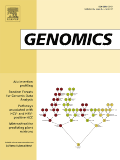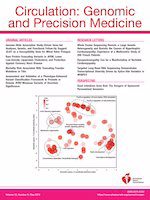
npj Genomic Medicine
Scope & Guideline
Shaping the Future of Healthcare with Genomic Insights
Introduction
Aims and Scopes
- Clinical Genomics and Personalized Medicine:
The journal prioritizes research that utilizes genomic data to tailor medical treatments to individual patients, particularly in the context of rare genetic disorders and complex diseases. - Genomic Technologies and Methodologies:
A strong emphasis is placed on innovative genomic technologies, including sequencing techniques, bioinformatics, and data analysis methods that enhance the understanding of genetic variations and their implications. - Population Genetics and Ethnic Diversity:
Research exploring genetic diversity across different populations is a core area, highlighting the significance of ethnic backgrounds in genetic predisposition to diseases and responses to treatments. - Integration of Genomics in Clinical Practice:
The journal aims to report on the integration of genomic data into clinical workflows, including diagnostic applications, therapeutic strategies, and the ethical considerations surrounding genomic medicine. - Disease Mechanisms and Genetic Contributions:
Investigations into the genetic underpinnings of various diseases, including cancer, neurodevelopmental disorders, and cardiovascular conditions, are a significant focus, elucidating how genetic factors influence disease pathology.
Trending and Emerging
- Polygenic Risk Scores and Predictive Genomics:
There is an increasing emphasis on polygenic risk scores as tools for predicting disease susceptibility and outcomes, showcasing their potential in personalized medicine and preventive healthcare. - Integration of Multi-Omics Approaches:
Emerging studies are increasingly adopting multi-omics strategies, integrating genomics with transcriptomics, proteomics, and metabolomics to provide a comprehensive understanding of disease mechanisms. - Ethics and Inclusivity in Genomic Medicine:
The journal is seeing a growing interest in the ethical implications of genomic research, particularly regarding inclusivity and representation in genetic studies, ensuring diverse populations are adequately represented. - Real-World Applications of Genomic Data:
Research is trending towards practical applications of genomic data in clinical settings, including the implementation of rapid genomic sequencing in urgent care scenarios and its impact on patient management. - Advancements in Gene Editing Technologies:
There is a surge in research focusing on gene editing technologies, such as CRISPR, and their potential therapeutic applications, indicating a shift towards innovative treatment strategies for genetic disorders.
Declining or Waning
- Basic Genetic Research:
Research focused solely on basic genetic mechanisms without direct clinical implications appears to be declining, as the journal emphasizes translational research that connects genetic findings to medical applications. - Single-Disease Focus Studies:
There is a noticeable decrease in studies that focus exclusively on single genetic disorders. Instead, the journal is increasingly featuring multi-disease approaches and integrative studies that consider the genetic basis of multiple conditions. - Traditional Genetic Testing Approaches:
With the advent of more sophisticated genomic sequencing technologies, traditional genetic testing methods are becoming less common in published research, as newer methods offer greater accuracy and broader insights. - General Population Studies:
The focus on broad population studies without specific clinical relevance is waning, with a shift towards studies that provide actionable insights for clinical practice and patient care.
Similar Journals

Annual Review of Genomics and Human Genetics
Unraveling the Complexities of Genetics with AuthorityAnnual Review of Genomics and Human Genetics, published by ANNUAL REVIEWS, represents a pivotal platform in the field of Genetics and Molecular Biology. With an impressive impact factor reflecting its high citation rate and scholarly influence, this journal is renowned for its authoritative reviews that synthesize current research across genomics and human genetics. Highlighting its Q1 category rankings in both Genetics and Clinical Genetics, as well as its ranking within the top tiers of Biochemistry and Genetics, the journal stands out as a leading resource for researchers, professionals, and students eager to stay abreast of groundbreaking developments in these rapidly evolving fields. While not currently an open access journal, its rigorous peer-review process ensures the highest standards of scientific integrity. Researchers can access comprehensive reviews that delve into both fundamental genetics concepts and cutting-edge discoveries, making it an essential resource for advancing understanding in human genetics and its applications.

NATURE REVIEWS GENETICS
Pioneering Reviews in the World of Genetics.NATURE REVIEWS GENETICS, published by NATURE PORTFOLIO, stands as a leading journal in the field of genetics, boasting a remarkable reputation reflected in its Q1 ranking across multiple categories including Genetics, Clinical Genetics, and Molecular Biology. With an impressive percentile of 99th in both Genetics and Clinical Genetics, as well as a solid rank in Molecular Biology, this journal is pivotal for researchers, professionals, and students alike who seek to stay informed on the latest advancements and comprehensive reviews in genetic research. The journal's scope encompasses a wide array of topics, providing in-depth insights from fundamental genetic principles to clinical applications, underscoring its importance in bridging basic science and medical practice. Though not an open-access publication, it remains accessible through various academic institutions, enhancing its reach and influence within the scientific community. With publication years spanning from 2000 to 2024, NATURE REVIEWS GENETICS continues to shape the future of genetics research and education.

GENOMICS
Where Cutting-Edge Genomics Meets Rigorous ScienceGENOMICS is a prestigious journal published by Academic Press Inc Elsevier Science, dedicated to advancing the field of genetic research and molecular biology. With an impressive impact factor, this journal is recognized for its rigorous peer-review process and high-quality publications that cover a wide range of topics within the genomics discipline. Operating from the United States, GENOMICS has established itself as a vital resource for researchers, professionals, and students alike, standing at Q2 in the Genetics category according to the latest rankings. With a rich history dating back to 1987 and convergence extending to 2024, the journal highlights cutting-edge discoveries and methodologies, ensuring that its readership remains at the forefront of genetic advancements. Although currently not an open-access journal, articles published within its pages are often accessible through various academic platforms, enhancing worldwide reach and dissemination. For those engaged in the fields of biochemistry, genetics, and molecular biology, GENOMICS serves as an indispensable platform for impactful research and collaborative initiatives.

Frontiers in Genetics
Advancing the Frontiers of Genetic KnowledgeFrontiers in Genetics is a premier academic journal dedicated to advancing the field of genetics through high-quality, peer-reviewed research. Published by FRONTIERS MEDIA SA in Switzerland since 2010, this Open Access journal provides a platform for researchers and practitioners to disseminate innovative findings across various subfields, including clinical genetics and molecular medicine. With a notable emphasis on interdisciplinary approaches, the journal holds a strong position in the academic landscape, achieving Q2 rankings in key categories such as Genetics and Molecular Medicine in 2023. Not only does Frontiers in Genetics contribute to the scholarly dialogue by publishing impactful studies, but it also promotes accessibility to vital research, ensuring that knowledge is available to a global audience. This journal is a vital resource for researchers, professionals, and students looking to stay at the forefront of genetic discoveries and their applications, reflective of its engagement with contemporary challenges in genetics and healthcare.

International Journal of Genomics
Connecting researchers to elevate genomic discourse.International Journal of Genomics is a pivotal open-access publication under the esteemed HINDAWI LTD, dedicated to advancing the fields of genomics, biochemistry, genetics, and molecular biology. Established in 2013, this journal aims to disseminate innovative research findings and foster scholarly dialogue among researchers, professionals, and students alike. With a robust Impact Factor reflective of its commitment to quality, the journal has achieved a Q3 ranking in Biochemistry, Genetics, and Molecular Biology, as well as notable placements in Pharmaceutical Science, indicating its broad relevance and influence in these interconnected fields. The journal is indexed in esteemed databases, ensuring high visibility and accessibility for published works. As an open-access journal, it prioritizes the sharing of knowledge across borders, facilitating greater collaboration and advancement in genomic research globally. Join the academic community in exploring the vast potential of genomics through the International Journal of Genomics, based in Egypt, and reaching audiences worldwide from its London office.

Molecular Genetics & Genomic Medicine
Exploring innovations in genetics and healthcare.Molecular Genetics & Genomic Medicine, published by WILEY, is an esteemed and open-access journal that has been a prominent source of knowledge in the fields of genetics and molecular biology since its establishment in 2013. With an ISSN of 2324-9269, it aims to provide a platform for the dissemination of novel findings and innovative research that pushes the boundaries of genomics and its clinical applications. The journal holds a Q3 categorization in Genetics, Clinical Genetics, and Molecular Biology, reflecting its growing influence in these disciplines, as evidenced by its Scopus rankings. Researchers, professionals, and students alike will find valuable insights and advancements in genomic medicine, making this journal an essential resource for those dedicated to the understanding and application of genetic and molecular research in healthcare. Located at 111 River St, Hoboken, NJ, Molecular Genetics & Genomic Medicine continues to foster a global dialogue within the scientific community, ensuring accessible knowledge for all.

GENETICS IN MEDICINE
Elevating Standards in Genetic MedicineGENETICS IN MEDICINE, published by Elsevier Science Inc, stands as a premier journal in the realms of clinical genetics and medicine. With an impressive impact factor and ranked #3 out of 99 in the category of Genetics (clinical), alongside a 97th percentile ranking in the Scopus database, this journal is recognized for its outstanding contribution to the field. Established in 1998, it aims to disseminate innovative research and clinical advancements bridging genetics and medical practice, making it essential reading for researchers, healthcare professionals, and students alike. Although not an open-access journal, GENETICS IN MEDICINE provides valuable insights into genetics that drive the future of personalized medicine and patient care. With a commitment to excellence, the journal continuously explores the evolving landscape of genetic research to foster the understanding and application of genetic principles in medical contexts.

HUMAN GENETICS
Illuminating the path to genetic understanding.HUMAN GENETICS, published by SPRINGER, stands as a cornerstone journal in the field of genetics, offering a wealth of research insights since its inception in 1964. Hailing from Germany, this esteemed journal boasts an impressive Q1 ranking in both Genetics and Clinical Genetics, marking it among the top quartile of journals in these categories for 2023. With a notable Scopus rank of #7 in Clinical Genetics and a percentile ranking of 93, HUMAN GENETICS attracts significant attention from researchers and professionals dedicated to advancing our understanding of genetic influences on human health and disease. Although it does not currently offer Open Access options, the journal provides a critical platform for scholarly communication, aimed at disseminating groundbreaking findings in genetics and biotechnology. As the field evolves, HUMAN GENETICS continues to play an instrumental role in bridging the gap between laboratory research and clinical application, making it an essential resource for students and seasoned researchers alike.

FUNCTIONAL & INTEGRATIVE GENOMICS
Elevating Genomic Science for a Healthier TomorrowFUNCTIONAL & INTEGRATIVE GENOMICS, published by Springer Heidelberg, is a leading journal in the fields of genetics and molecular biology. Established in 2000, it serves as a pivotal platform for advancing our understanding of genomic functionality and integration, making significant contributions to both basic and applied research in genetics. With a robust impact factor and a ranking in the Q3 quartile for Genetics and Q2 for Medicine (Miscellaneous), the journal aims to publish innovative research that explores the relationships between genomic data and biological functions, appealing to a diverse audience of researchers and professionals. Although it operates under a subscription model, the journal's extensive archives remain a valuable resource for academics seeking to stay abreast of the latest findings and methodologies in genomics. As the field evolves, FUNCTIONAL & INTEGRATIVE GENOMICS remains committed to fostering scholarly dialogue and the dissemination of groundbreaking studies that influence future research trajectories.

Circulation-Genomic and Precision Medicine
Pioneering Research at the Intersection of Circulation and GenomicsCirculation-Genomic and Precision Medicine is a leading peer-reviewed journal published by Lippincott Williams & Wilkins, dedicated to advancing the fields of cardiology, cardiovascular medicine, and genetics. With an impressive impact factor and ranked in the Q1 quartile across multiple categories, including Cardiology and Genetics, this journal is pivotal for researchers and professionals seeking the latest insights and advancements in precision medicine. Established in 2018, it has rapidly gained recognition, evidenced by its commendable Scopus ranking and high percentiles among related fields. The journal emphasizes open access to enhance the dissemination of knowledge, making cutting-edge research readily available to a global audience. With the convergence of genomic science and cardiovascular health, Circulation-Genomic and Precision Medicine aims to foster interdisciplinary collaborations, offering a vital platform for innovative studies that impact patient care and clinical practices.